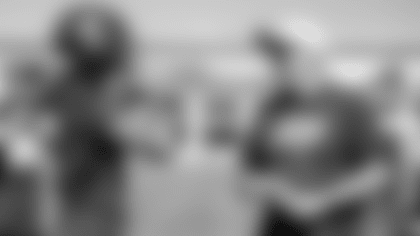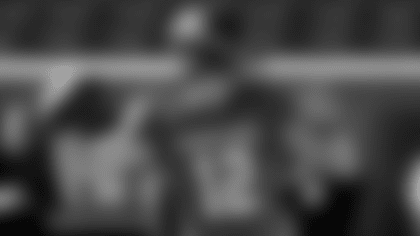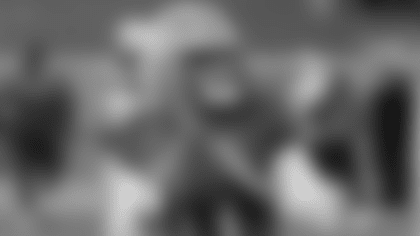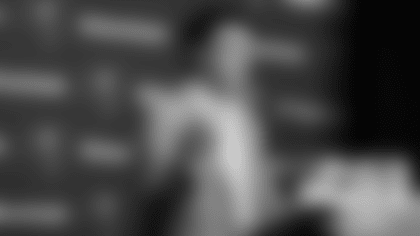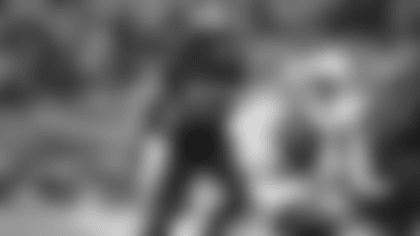After explaining the latest changes to the rulebook, visiting officials came out to Friday's practice to help improve the quality of play
NFL referee John Parry and two members of his game-day crew visited the Tampa Bay Buccaneers' training camp on Friday with an 11-minute video, a clutch of handbooks and a desire to make sure the team was up to date on all of the league's rule changes.
Parry also came with this message: The league is in great shape and its 120 hard-working officials only want to make it better.
Most of this year's changes shared several common threads – they make the game a little easier to officiate, a little less subjective to call and, most importantly, a little safer for the men who play it.
Whether it's the removal of the forceout rule on the sideline, the simplification of facemask calls or the emphasis on chop block infractions, the league's constant tweaking of the rulebook is a positive for Parry and his colleagues.
"I think all the officials would certainly support any rule that makes it a little bit easier, takes out subjectivity and creates a safer environment for the player," said Parry, a financial advisor by trade who is in his 9th year with the league.
NFL officials are scrutinized intensely each season, both by those who report on the game and those who administer it. They attend a mandatory three-day clinic each July in which they focus on analysis of new rules, physical workouts, officiating mechanics and the like. They are subject to exams and video review and are required to understand not only the rules but the philosophy behind each one. During the season, each game is reviewed, play by play, and the officials discuss the review on the day before their next game. They are also sent instructional training tapes during the season, compilations of specific plays with added commentary, both positive and negative, to emphasize the important issues.
All of these procedures produce well-officiated games in the NFL. When a call is missed it often receives significant media coverage, largely because such mistakes are rare.
"If we can get it right, let's get it right," said Parry. "We're not perfect. The speed at which some of these guys are moving, some of the calls that we have to make are extremely difficult. Percentage-wise, we're pretty good at it."
That effort also involves making sure the league's players and coaches are well-versed on the rules. One crew will visit each team during training camp and conduct meetings with the players and coaches as well as with members of the local media. In addition to outlining the newest language in the rulebook, the officials also inform the teams which rules will be particular points of emphasis in the upcoming season.
In 2008, those points of emphasis include plays that endanger the quarterback – forceful hits below the knees, etc. – and defenseless wide receivers, as well as always controversial chop blocks along the line of scrimmage. The NFL-produced video that the officials play for the team also stresses the issue of mutual respect between players, coaches and officials. Referees will be keeping a keen eye out for instances of taunting and prolonged celebrations.
Most of the 2008 rules changes received wide coverage when they were passed by the Competition Committee this past spring, including the forceout issue and the addition of a helmet radio on the defensive side of the ball. The purpose of Parry's visit is to explain the mechanisms and the philosophies of those changes to the Bucs' players and staff.
In many cases, how those new rules are received by the audience of players depends on which side of the ball each man plays on. For instance, the elimination of the forceout rule – previously, a play could be ruled a completion if a receiver made the catch but didn't get two feet inbounds because he was ruled to have been pushed out by a defender – is considered a positive change by most defenders and an annoyance by most receivers.
Parry appreciates the change because it removes one of the more subjective and tricky elements of his job.
"Forceout is difficult for us, absolutely, because it's an angle thing," he explained. "When my friends look at a game on TV, they wonder, 'How in the world could you have missed that, or not ruled that to be a forceout?' Well, when we're at this level at that speed, that's difficult. So it's an angle issue.
"Also, you and I might judge a forceout differently. Whether or not you felt he would have come down, whether or not I thought he would have come down, the speed at which he's moving, going vertical versus moving at an angle – all those things went into that [judgment] so they removed it."
Parry also agrees with the underlying philosophy of the change. If a defender can get to the pass-catcher and force him out of bounds before the catch is made, shouldn't he be rewarded for making a good defensive play?
On the other hand, the elimination of the five-yard facemask penalty, which also reduces the subjective element of the call, is most important for how it impacts player safety, Parry says.
Previously, an official had to make a judgment call on the severity of the facemask infraction. The existence of the five-yard penalty for an incidental foul in addition to the 15-yard personal foul allowed officials to choose one or the other based on how violent the infraction appeared to be. Now it's much simpler: a brushing of the facemask that doesn't endanger the player is no penalty, while any contact that does is a very significant penalty.
"Our thought process is: Twist, turn, jerk, safety," said Parry. "If one of those four scenarios exist, it's 15 [yards]. They're concerned with player safety, and they should be, considering the speed with which those guys move."
When the league begins its process of analyzing the rulebook and considering changes each offseason, it seeks the input of its own officials, among other resources. This year's emphasis on chop-block rules, for instance, springs in part from the suggested changes the officials have sent in during recent offseasons. Parry is personally quite satisfied with the rulebook as it is currently written, though he wouldn't mind if one other section got a slight makeover.
"I would like to see intentional grounding made a little bit easier for me to call, because I can tell you that I'm 0-4," he said with a laugh. "There's a lot of subjectivity. Sometimes you feel like he's dumping, sometimes you don't if there's a player in the vicinity. What's in the vicinity? Depends on who you talk to.
"There are a couple rules I think we could tweak, but the game is in great shape. When you have these types of changes, the game is in great shape."



